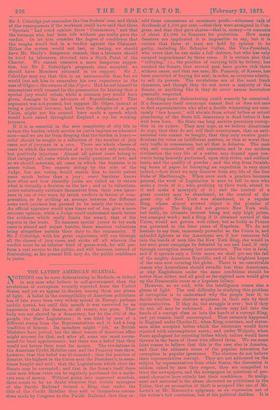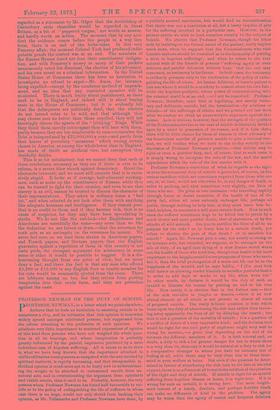THE LATEST AMERICAN SCANDAL.
NOTHING can be more disheartening to Radicals, or indeed to any men who believe in self-government, than the revelations of corruption recently reported from the United States, and yet we appear to discern among them one gleam of light. A belief in the corruptibility of American politicians has of late years been very widely spread in Europe, perhaps unduly spread, but until this month it was corrected by an impression that the Senate, at all events, was pure. That body was not elected by a democracy, but by the elite of the people, the State Legislatures ; it was filled by men of a different stamp from the Representatives, and it had a long tradition of honour. Its members might " job," as British Ministers have jobbed, but the short tenure of American office might account for that, and after all, some one must recom- mend for local appointments ; but there was a belief that they would not betray their trust for money. The revelations in the American Credit Mobilier case, and the Pomeroy case show, however, that this belief was ill-founded ; that the position of Senator, the highest in the Union next the President's, is some- times bought and sold ; that the Legislatures which elect the Senate may be corrupted ; and that in the Senate itself there exist men whose votes can be regularly purchased for a mode- rate sum of money. Without going into unproved scandals, there seems to be no doubt whatever that certain managers of the Pacific Railroad formed a Ring, that under the title of the Credit Mobilier they sold to themselves conces- sions made by Congress to the Pacific Railroad, that they re- sold these concessions at enormous profit—witnesses talk of dividends of 1,500 per cent.—that they were arraigned in Con- gress, and that they gave shares—that is, money—in amounts of about £1,000 to Senators for protection. How many Senators are implicated it is impossible to say, but it is certain that three at least are held by opinion to be guilty, including Mr. Schuyler Colfax, the Vice-President, who avers that he can make a full defence, but who has only escaped impeachment by three votes. It is certain also that " lobbying," i.e., the practice of carrying bills by bribery, has reached the Senate, that several men have grown rich there without cause, and that one man, Mr. Pomeroy, of Kansas, has been convicted of buying his seat, in order, as everyone admits, to sell its powers. The revelations are of the most frank character, and though they do not cover a majority of the Senate, or anything like it, they do cover names heretofore generally respected.
Anything more disheartening could scarcely be conceived. If a democracy itself uncorrupt cannot find or does not care to find representatives who after a double winnowing are com- monly " law honest," will abstain from actual bribes or actual plundering of the State till, democracy is dead before it has well been born. No State can long survive pecuniary corrup- tion in its rulers. They may urge, as we believe Americans do urge, that they do not sell their countrymen, that an anti- national vote cannot be bought, that they only receive grati- fications for votes on indifferent matters, or that at worst they only traffic in concessions, but all that is delusive. The men who sell concessions will sell contracts, and in our moderq civilisation the very life of a nation may depend upon con- tracts being honestly performed, upon ship rivets, and soldiers' boots, and the quality of powder ; and the step from furnish- ing boots of paper to betraying an expedition is very short indeed,—how short we may discover from any life of the first Duke of Marlborough. When once such a practice becomes general, the work of Legislation is sure to fall to men who make a trade of it ; who, profiting by their work, attend to it and make a monopoly of it ; and the control of a ante in one of two ways, by lavish verdicts in favour of corn- great country may be abandoned, as the control of the pensation, or by striking an average between the different great city of New York was abandoned, to a regular sums each juryman has guessed to be nearly the true value. Ring, whose almost avowed object is the plunder of An official appraiser would nine times out of ten give a more the people. The Ring did not govern New York well, accurate opinion, while a Judge could understand much better but badly, its ultimate interest being not only high prices, the evidence which really limits the award, that of the experts in the trade. To summon special jurors to try such cases is absurd and unjust besides, these amateur valuations being altogether outside their duty to the community. If
However, as we said, with the intelligence comes also a gleam of light. The real difficulty in studying this problem of corruption is to understand why the people bear it, to decide whether the electors acquiesce in their sale by their representatives. If they do, the struggle is over ; but if they do not, all may be redeemed. A nation may fall into the hands of a corrupt class as into the hands of a corrupt King, and yet remain itself uncorrupted. That certainly happened in England under Charles II., when King, courtiers, and states- men alike accepted bribes which the electorate would have rejected with contemptuous scorn; and under Walpole, when Peers apologised for rejecting bribes which tailors would have thrown in the faces of those who offered them. We see some faint reason to believe that this is the case also in America, and that the ultimate cause of the popular toleration for corruption is popular ignorance. The electors do not believe their representatives corrupt. They are not addressed on the subject by representatives from other States, the discussion is seldom raised by men they respect, they are compelled to trust the newspapers, and the newspapers on questions of per- sonal character have utterly lost their confidence. So malig- nant and universal is the abuse showered on politicians in the Union, that an accusation of theft is accepted like one of Mr. Lowe's or Mr. Harcourt's epigrams, as an expression not of the writer's full conviction, but of his political dislikes. It is regarded as a statement by Mr. Odger that the Archbishop of Canterbury stole chasubles would be regarded in Great Britain, as a bit of " peppered tongue," not worth an answer, and hardly worth an action. The moment that by any acci- dent the evidence comes before the people in a way thee• trust, there is an end of the bribe-taker. In this very Pomeroy affair, the moment Colonel York had produced indis- putable proofs the contest was at an end. The members of the Kansas Houses dared not face their constituents' indigna- tion, and with Pomeroy's money in many of their pockets unanimously voted his dismissal, the election of his adversary, and his own arrest on a criminal information. In the United States House of Commons there has been no hesitation to investigate, no refusal to expel—Mr. Ames, for instance, being expelled—except by the cumbrous method of impeach- ment, and no idea that any convicted member will be re-elected. There is much lenity about punishment, as there used to be in England, and indeed still is about buying seats in the House of Commons ; but it is evidently felt that the delinquents are politically dead, that the electors do not intend votes to be sold, and that although they may choose men no better than those expelled, they will not knowingly choose the agents of the " lobbying" Rings. While they think them merely extravagant they will bear with them, partly because they are too comfortable to care—remember the Debt is beingreduced by £25,000,000 a year—and partly from that horror of pecuniary "meanness " which among certain classes in America, as among the whole lower class in England, has made of thrift an artificial vice, but corruption they decidedly dislike.
This is so far satisfactory, but we cannot deny that each of these revelations, necessary as they are if there is ever to be reform, is a severe blow struck against democracy. Grant the electorate innocent, and we must still concede that it is exces- sively stupid. It looks as if average, half-educated working- men, such as make up the constituency of Kansas, while they can be trusted to fight for their country, and even to see that slavery is an evil, cannot be trusted to discern the character of their representatives. They select in ordinary times a " bad lot," and when selected do not look after them with anything like adequate keenness and intelligence. If they remain poor, that is no credit to them, and if they become rich, that is no cause of suspicion, for they may have been speculating in stocks. We do not like the out-look—for Englishmen and Americans are essentially the same—any more than we like the deduction we are forced to draw,—that the reverence for rank acts as an antiseptic on the reverence for money. We never feel sure, as we read these stories in American papers, and French papers, and German papers, that the English guarantee against a repetition of them in this country is not caste pride, the strongest argument for aristocracy in some sense or other it would be possible to suggest. It is a dis- heartening thought from our point of view, but we never deny a fact, and there the fact is that any man who offered £1,200 or £12,000 to any English Peer or county member for his vote would be summarily ejected from the room. There are lobbyers among us, too, but they refrain from putting temptation into that crude form, and they are powerless against the caste.



































 Previous page
Previous page